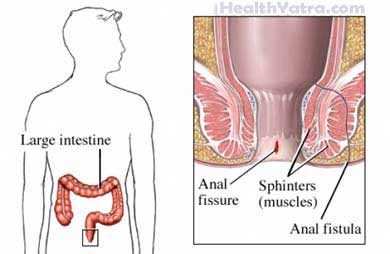Definition
An anal abscess is a pus-filled glandular cavity near the anus, either deep in the rectum or close to the anus opening. When the abscess opens to the surface and fails to heal, a fistula occurs. The fistula will often drain pus or fecal material.
Since some absesses require surgery, talk to your doctor right away if you think you may have this condition.
Causes
Abscesses result when bacteria infect a mucus-secreting gland in the anus or rectum, causing blockage and damage to surrounding intramuscular tissue. The reason why the infection occurs is unknown because, normally, this area is free from infection.
Risk Factors
A risk factor is something that increases your chance of getting a disease or condition.
The following factors increase your chance of developing an anal abscess. If you have any of these risk factors, discuss them with your doctor:
- Sex: male
- Colitis or other inflammatory bowel disease (eg, Crohn’s disease)
Symptoms
If you experience any of these symptoms do not assume it is due to an anal abscess. These symptoms may be caused by other health conditions. If you experience any one of them, discuss them with your doctor.
Symptoms include:
- Abscess located near the surface of the skin on the buttocks:
- Pain and tenderness radiating from the location of the abscess
- Visible redness and swelling
- Fever
- Abscess located deeper within the rectum:
- Pain in the lower abdomen
- Swelling in the rectum that can be seen during examination of the rectum
- Fever
Anal abscesses may be accompanied by pain with stool and/or stool incontinence.
Diagnosis
Your doctor will ask about your symptoms and medical history, and perform a physical exam. While your doctor will be able to see an abscess near the surface of the skin, he may need to exam the rectum with a gloved finger to determine the presence of a deeper abscess. Tests that may be done include:
- Ultrasound
- MRI scan
Treatment
Treatment normally consists of draining the abscess, which is done by making an incision through the skin near the anus into the abscess. For this, you will be given local anesthesia. In rare cases, admittance to a hospital is required, as well asgeneral anesthesia. Antibiotics may be given to reduce fever or under other special circumstances. If you have Crohn’s disease, your doctor will give you medicine to treat this condition.
Complications of Treatment
Following drainage (or natural rupture) of an abscess, more than half the cases will develop into anal fistulas—usually occurring weeks but sometimes years later. In this condition, a permanent abnormal channel is formed from the site of the original abscess to the surface of the skin near the anus. This channel (fistula) allows for the continuous drainage of the abscesses’ pus-like fluid. In the case of a fistula, surgery to remove and close-up the channel is normally recommended. In rare cases, the fistula (and stool incontinence) will return after surgery.
If you are diagnosed with an anal abscess or fistula, follow your doctor’s instructions .

Prevention
There are no known ways to prevent anal abscesses or subsequent fistulas because the cause of the original infection of anal glands is unknown.
